SQLite Query Analyzer - A Decade-Long Journey with C++ and Qt
There’s something deeply satisfying about revisiting a project you created over a decade ago and breathing new life into it. Today, I want to share the story of SQLite Query Analyzer, a cross-platform database management tool that began as a personal necessity in 2011 and has recently undergone a complete modernization to embrace contemporary C++ practices and the latest Qt framework features.
Back in 2011, I found myself in a predicament that many developers face. I was working extensively with mobile applications that relied heavily on SQLite databases for local data persistence. While there were several database management tools available at the time, most were either too heavyweight for my needs, lacked cross-platform compatibility, or simply didn’t provide the streamlined workflow I required for rapid development and debugging. I needed a tool that could do what none of the existing tools could do.
The mobile development landscape in 2011 was quite different from today. Most of the work I did ran on even older Windows CE based handheld devices. These industrial devices had a 15-year lifetime, and cost a fortune. I was dealing with resource-constrained devices, and every byte mattered. SQLite was (and still is) the go-to solution for local data storage, but debugging and managing these databases during development was often cumbersome. I needed something fast, lightweight, and intuitive – a tool that could keep up with my development workflow without getting in the way. It also needed to work on MacOS, Windows, and Linux
That’s when I decided to create SQLite Query Analyzer. The goal was simple: build a no-nonsense, efficient database management tool that would allow me to quickly inspect, query, and modify SQLite databases during mobile app development. I chose C++ for its performance characteristics and Qt for its excellent cross-platform capabilities and mature UI framework.
The Technical Foundation
From the beginning, SQLite Query Analyzer was designed with several core principles in mind:
Performance First: Working with mobile development taught me to respect the value of speed and efficiency. The application needed to start instantly, load databases instantly, and execute queries without delay.
Cross-Platform Compatibility: Developing for Windows, macOS, and Linux required a tool that could run reliably on all major operating systems. Qt’s robust cross-platform support enabled me to maintain a single codebase while delivering native experiences across different environments.
Simplicity and Usability: The interface needed to be intuitive enough for quick database inspections during debugging sessions, yet powerful enough for more complex database management tasks.
Modern UI Paradigms: Even in 2011, I wanted the application to feel contemporary and integrate well with the native look and feel of each operating system.
Features That Matter
Over the years, SQLite Query Analyzer has evolved to include features that directly address real-world database management needs:
Theme Awareness: In our modern development environments, dark mode isn’t just a preference – it’s often a necessity for long coding sessions. The application automatically detects and adapts to your system’s color theme, providing a comfortable viewing experience in both light and dark modes.
Intelligent Query Interface: The application provides a clean, syntax-highlighted SQL editor that makes writing and executing queries a pleasant experience. Whether you’re running a simple SELECT statement or a complex JOIN operation, the interface stays out of your way and lets you focus on the data.
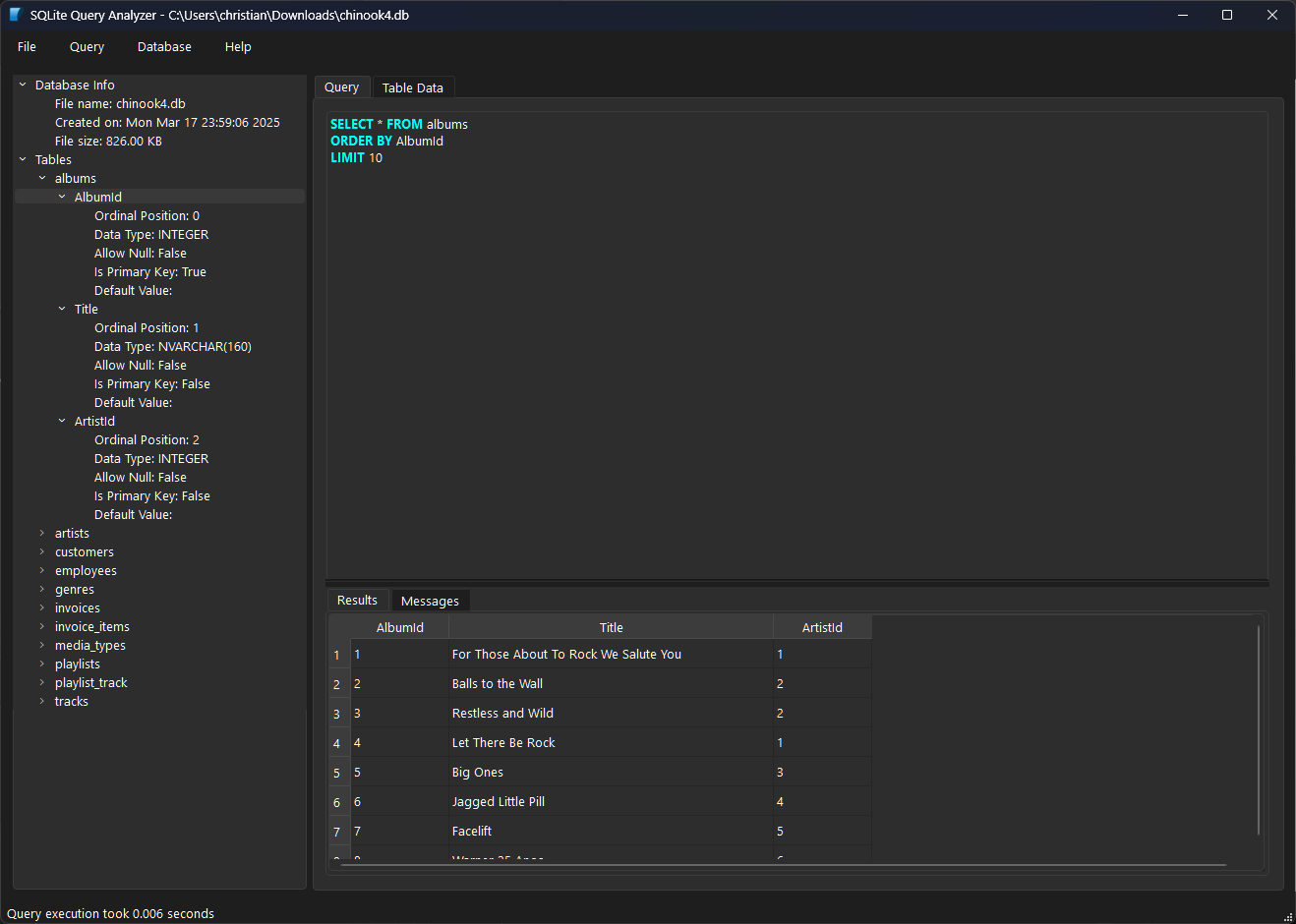
Speed: Loading a database over 100GB takes microseconds. Executing queries are equally fast (of course given that the query is also fast)
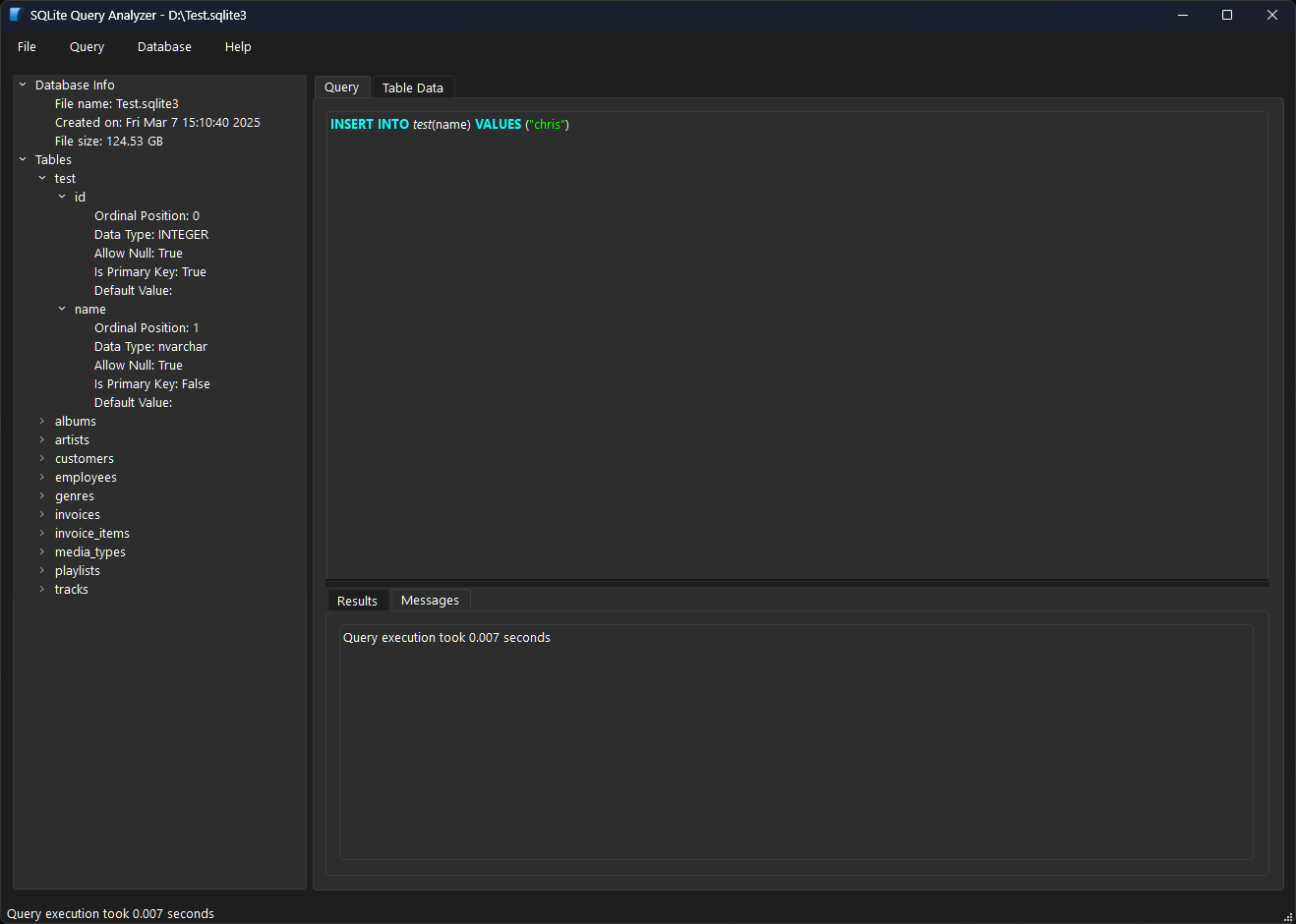
Direct Table Editing: One of the features I’m most proud of is the ability to edit table data directly within the interface. This eliminates the need to write UPDATE statements for simple data modifications, significantly speeding up the development and testing process.
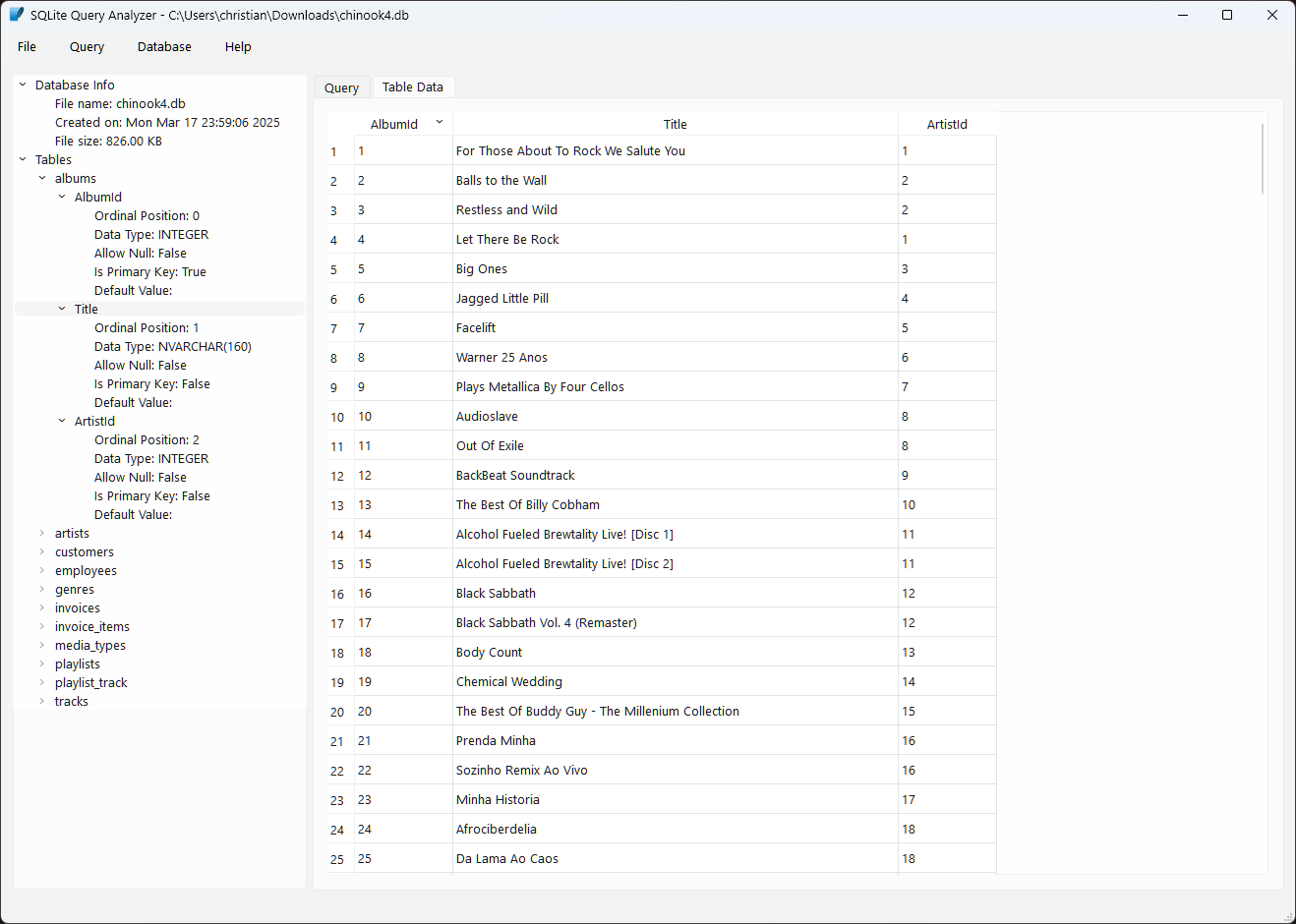
Session Persistence: The application remembers your last session, including open databases, recent queries, and window positioning. This might seem like a small detail, but it makes a huge difference in daily workflow efficiency.
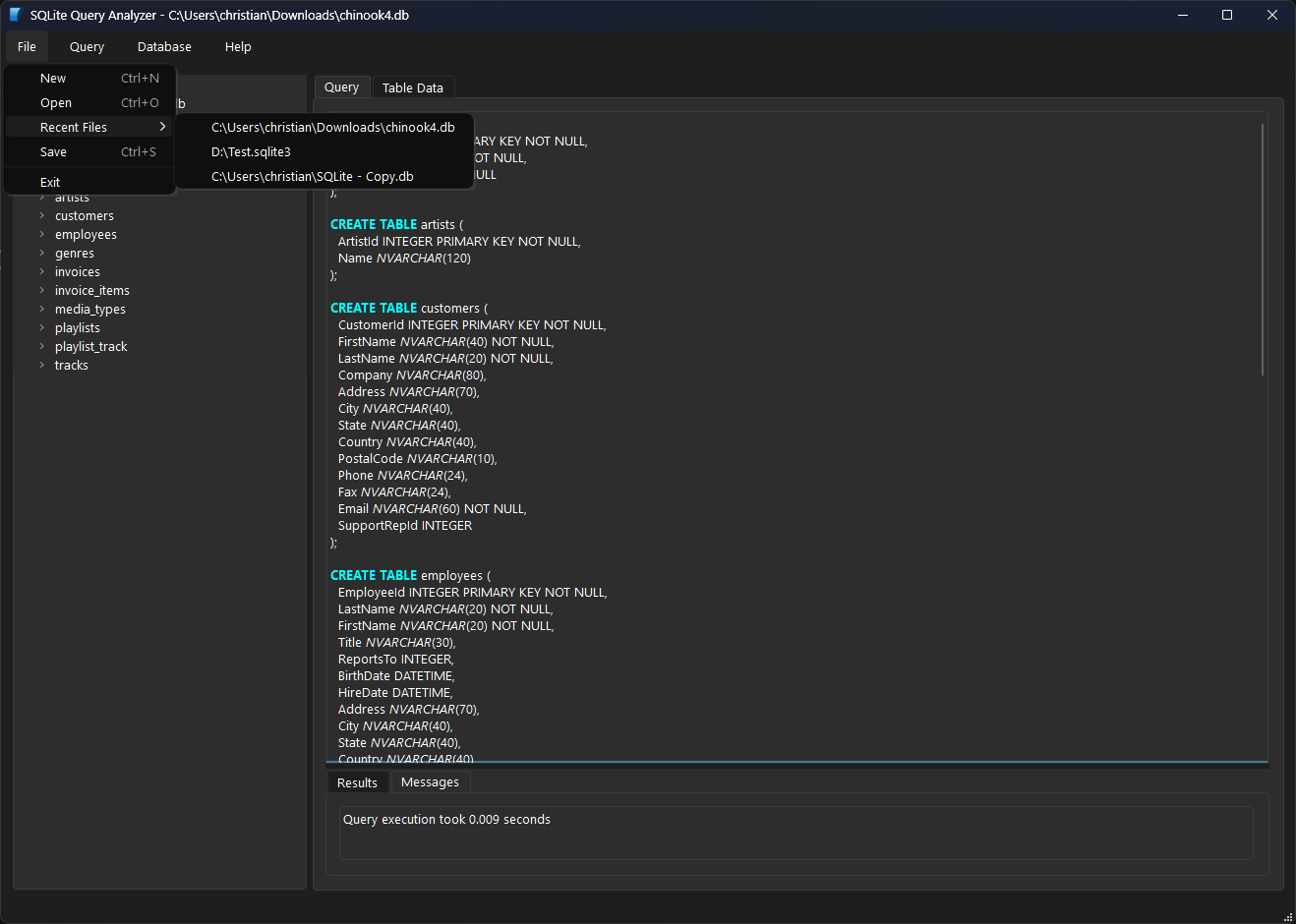
Data Export Capabilities: Need to share your database structure or data? The tool can export schemas as CREATE TABLE statements and data as SQL INSERT scripts or CSV files. This has proven invaluable for documentation, migration scenarios, and sharing sample data with team members.
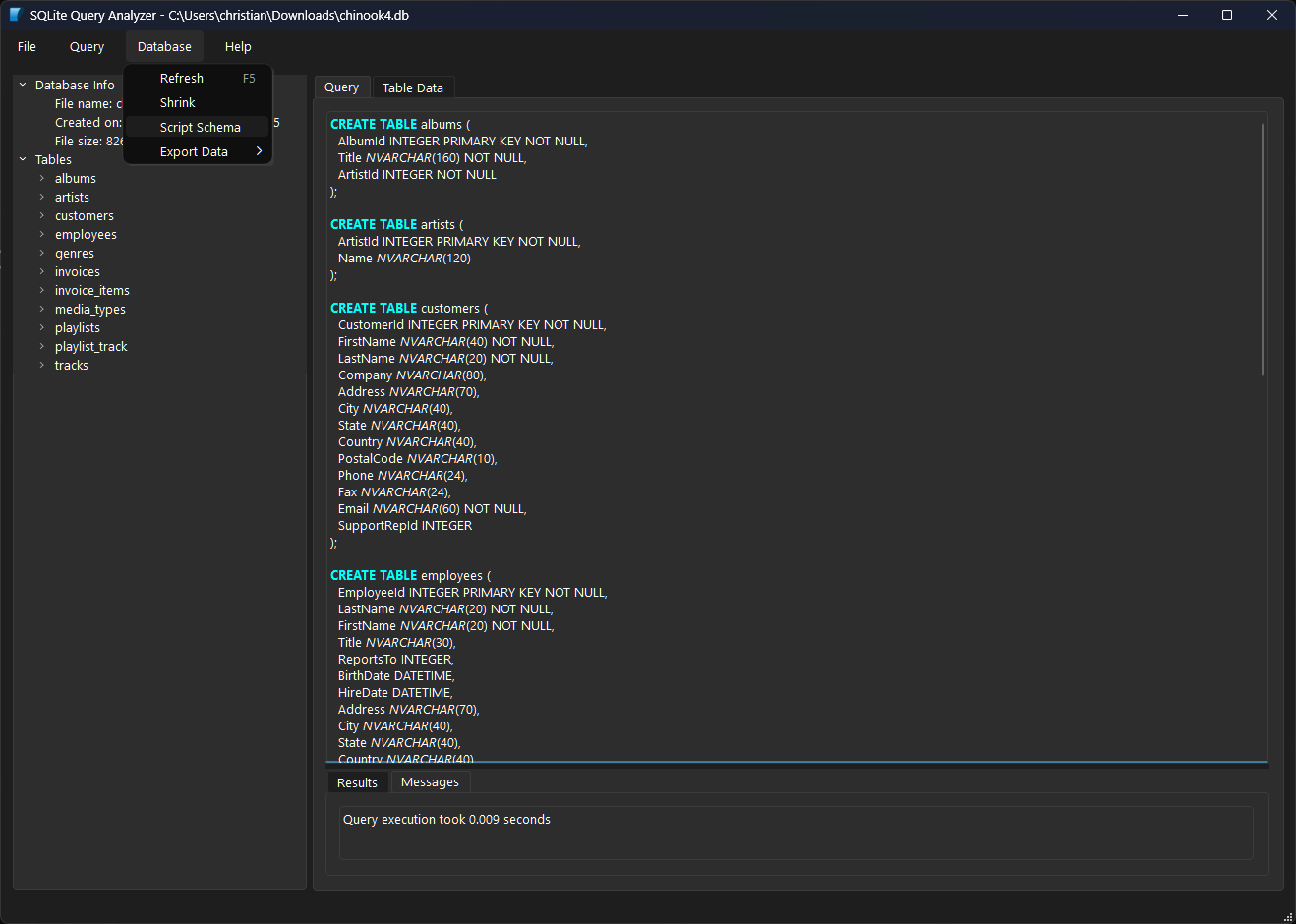
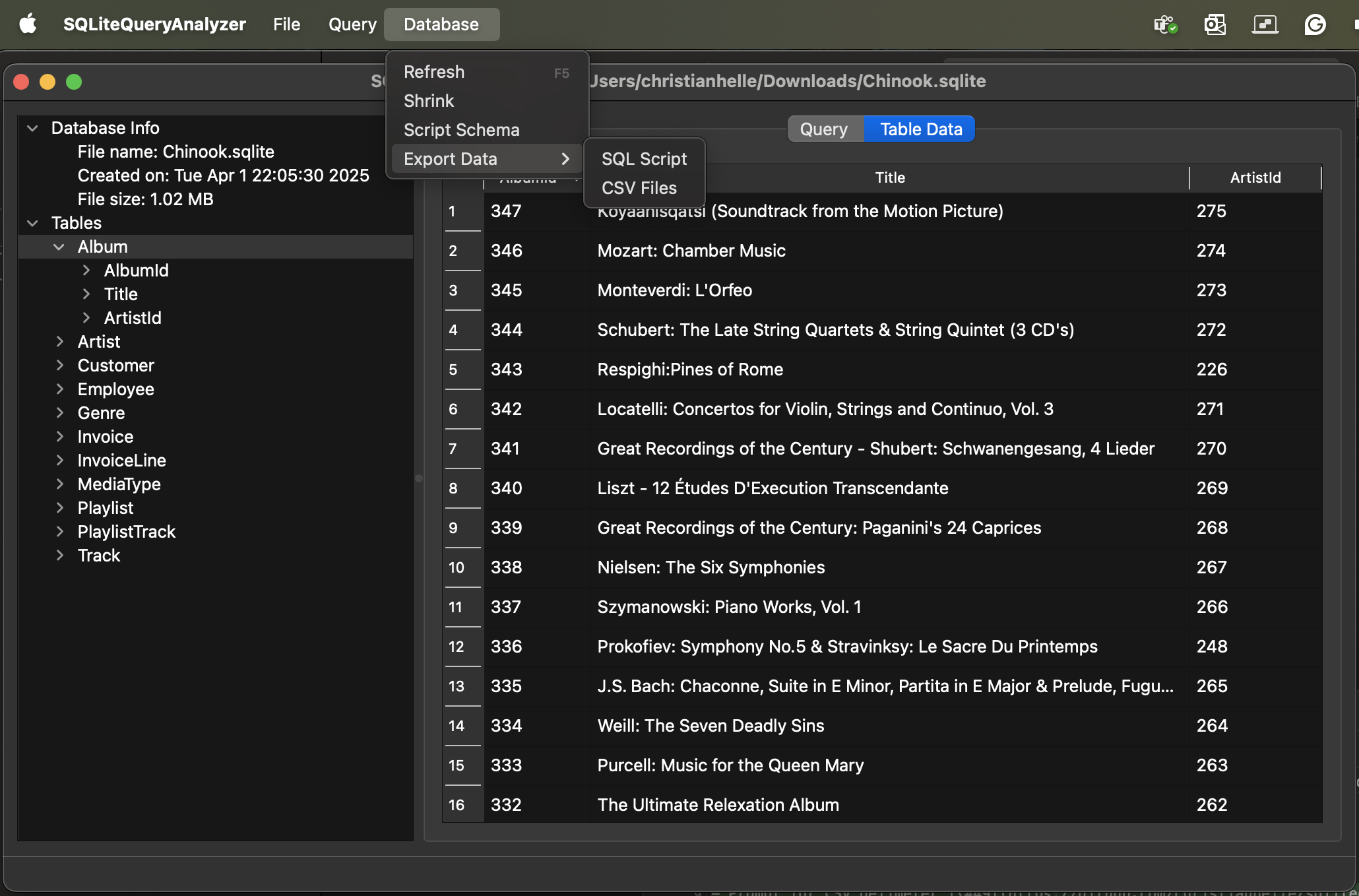
Modernization
Recently, I decided it was time to give this decade-old project the attention it deserved. The C++ landscape has evolved significantly since 2011, with C++17 and C++20 introducing numerous improvements that make code more expressive, safer, and more maintainable. Similarly, Qt has continued to innovate, with Qt 6 bringing substantial improvements in performance, API design, and cross-platform consistency.
The modernization effort focused on several key areas:
Modern C++ Standards: The codebase has been updated to leverage C++17 and C++20 features, including structured bindings, constexpr enhancements, and improved type deduction. This makes the code more readable and allows the compiler to perform better optimizations.
Qt 6 Migration: Moving to Qt 6 brought numerous benefits, including better high-DPI support, system-aware themes for light and dark mode, improved rendering performance, and more consistent behavior across platforms.
Enhanced Build System: The project now uses CMake with modern practices, making it easier to build across different platforms and integrate with various development environments. The build system now properly handles dependencies and provides clear configuration options for different deployment scenarios.
Improved Code Architecture: Years of experience have taught me better patterns for organizing C++ code. The modernized version features cleaner separation of concerns, better error handling, and more robust memory management practices.
CI/CD Integration: The project now includes comprehensive continuous integration pipelines for Windows, macOS, and Linux, ensuring that changes don’t break compatibility across platforms. This automation gives me confidence when making changes and helps maintain the quality standards the project deserves.
Working with Qt and SQLite
One of the most interesting aspects of this project has been the intersection of Qt’s powerful database abstraction layer with SQLite’s unique characteristics. Qt’s QSqlDatabase and related classes provide an excellent foundation for database operations, but SQLite’s specific features and behavior patterns require careful consideration.
The cross-platform nature of both Qt and SQLite creates some fascinating technical challenges. File path handling, for example, needs to account for different path separators and naming conventions across operating systems. Similarly, font rendering and UI scaling behaviors vary significantly between platforms, requiring careful testing and adjustment to ensure a consistent user experience.
The project has also been a testament to the longevity of well-designed technologies. Both C++ and Qt have proven to be incredibly stable platforms for building desktop applications. Code written in 2011 still compiles and runs today with minimal modifications, which speaks to the maturity and backward compatibility of these technologies.
Perhaps most importantly, this project has reinforced my belief in the value of creating tools that enhance developer productivity. In an industry that’s constantly evolving and introducing new frameworks, platforms, and paradigms, having reliable, efficient tools for fundamental tasks like database management remains as important as ever.
Looking Forward
As we move further into 2025, SQLite Query Analyzer continues to serve its original purpose while adapting to modern development needs. The recent modernization ensures that it will continue to be a valuable tool for developers working with SQLite databases, whether they’re building mobile applications, desktop software, or embedded systems.
The open-source nature of the project means that it can continue to evolve with community input and contributions. I’ve always believed that the best tools are those that grow organically based on real-world usage and feedback from the people who rely on them daily.
For developers interested in C++ desktop application development, the project also serves as a practical example of how to build cross-platform applications using Qt. The source code demonstrates real-world patterns for database integration, UI design, and cross-platform deployment – knowledge that’s valuable regardless of the specific domain you’re working in.
Try It Yourself
SQLite Query Analyzer is available as an open-source project on GitHub, complete with installation and build instructions for Windows, MacOS, and Linux. Whether you’re a mobile developer working with SQLite databases, a desktop application developer looking for a lightweight database tool, or simply someone interested in seeing how modern C++ and Qt can be used together, I encourage you to give it a try.
The project includes comprehensive build documentation and automated builds for all major platforms, making it easy to get started regardless of your development environment. And if you find it useful or have suggestions for improvements, I’d love to hear from you – that’s the beauty of open-source development.